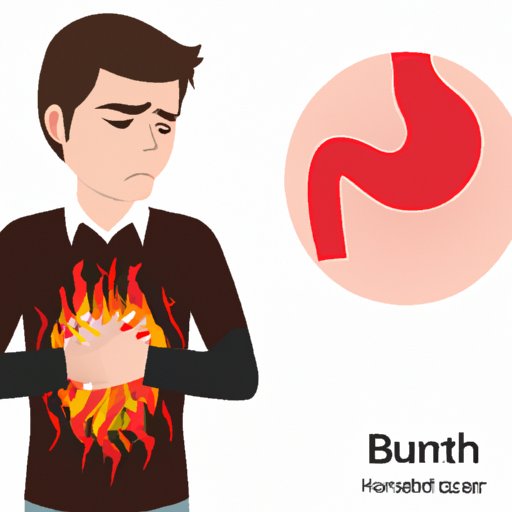
I. Introduction
Most of us have experienced that burning feeling in our chest after a spicy meal or a stressful day. Heartburn, also known as acid indigestion, is a common digestive disorder that affects millions of people globally. It occurs when the stomach acid flows back into the esophagus, causing irritation and discomfort. Recognizing the symptoms of heartburn is crucial to prevent recurrent episodes and maintain digestive health.
II. Is That Burning Sensation in Your Chest Heartburn? Recognizing the Common Symptoms
Heartburn is a symptom of acid reflux commonly described as a burning sensation in the chest. It can feel like a tight band of pain or pressure that occurs behind the breastbone and may also radiate to the neck or throat. Other common signs and symptoms of heartburn include:
- Burning Sensation: Usually occurring after meals or at night, accompanied by burping, bloating, and gas.
- Chest Pain: Usually, it’s a sharp pain in the center of the chest that often worsens when lying down or bending over.
- Sour Taste in Mouth: Often accompanied by a bitter or acidic taste in the back of the throat that worsens with bending over or lying down.
- Difficulty Swallowing: Often caused by the narrowing of the esophagus or inflammation of its lining.
Recognizing these symptoms is important because they can mimic those of other serious conditions like a heart attack. Distinguishing heartburn from other conditions can help prevent unnecessary stress and expense by avoiding unnecessary tests and procedures.
III. Don’t Ignore the Burn: How to Identify the Symptoms of Heartburn
Heartburn symptoms can vary widely from person to person, but some common patterns can help identify if you have heartburn symptoms. Understanding the location, timing, and duration of discomfort is crucial in distinguishing heartburn from other conditions.
- Location of Pain: Heartburn usually causes discomfort under the breastbone or chest bone. It typically involves only the upper abdomen and may occasionally radiate to the throat, neck, or ears.
- Time of Occurrence: Heartburn often occurs after eating or during the night and may be aggravated by lying down or bending over.
- Duration of Symptoms: Heartburn usually lasts for several hours and can come and go in episodes.
Exacerbating factors can also significantly contribute to heartburn symptoms. Some of these factors include:
- Certain Foods: Spicy and high-fat foods, caffeine, and alcohol can trigger symptoms of heartburn. Common culprits include chocolate, coffee, citrus fruits, and tomato-based products.
- Medications: Certain medications like aspirin, ibuprofen, and blood pressure drugs can worsen heartburn symptoms.
- Lifestyle Habits: Smoking, stress, and lack of physical activity can also exacerbate heartburn symptoms.
Identifying these triggers is essential in managing heartburn symptoms and preventing recurrent episodes.
IV. A Guide to Understanding Heartburn: Know the Symptoms
Heartburn is caused by the backflow of stomach acid into the esophagus, typically from weak or damaged lower esophageal sphincter (LES) muscles. Several factors can contribute to the weakening of the LES, including poor diet, obesity, and certain medical conditions. Identifying the causes of heartburn is vital in managing the symptoms. Some of the most common causes of heartburn include:
- Acid Reflux: One of the most common causes of heartburn is acid reflux, a condition in which stomach acid flows back into the esophagus.
- Hiatal Hernia: A hiatal hernia happens when part of the stomach pushes into the chest through a diaphragm’s weakness, making the LES more likely to leak acid into the esophagus.
- Obesity: Obesity increases pressure on the stomach and can cause the LES to be weakened, causing heartburn symptoms.
Recognizing the triggers of heartburn symptoms is crucial in preventing heartburn episodes. Common triggers include:
- Spicy Foods: Spicy foods are known to trigger heartburn symptoms due to their high-fat content and acid content.
- Alcohol and Caffeine: Alcohol and caffeine can increase acid production in the stomach, leading to heartburn symptoms.
- Smoking: Smoking can weaken the LES muscles and increase acid production, leading to heartburn symptoms.
V. The Warning Signs of Heartburn: What to Look Out For
While heartburn is a common digestive disorder, severe heartburn symptoms can indicate a more severe underlying condition. It’s essential to recognize warning signs that require medical attention, such as:
- Increased Frequency of Heartburn: If you experience heartburn two or more times a week, it may be an indication of gastroesophageal reflux disease (GERD).
- Severe Pain or Discomfort: If you experience prolonged and severe pain or discomfort in the chest or upper abdomen, it may indicate an esophageal tear or inflammation.
- Difficulty Swallowing or Breathing: Difficulty swallowing or breathing may indicate an esophageal narrowing or inflammation, requiring medical attention.
If you have any of these symptoms, it’s vital to seek medical attention to prevent further complications.
VI. Feeling the Burn? Identifying the Symptoms and Causes of Heartburn
Recapping heartburn symptoms and causes can help identify heartburn triggers and prevent recurrent episodes. Making lifestyle modifications such as avoiding triggers, eating smaller meals, and taking over-the-counter antacids can significantly reduce heartburn symptoms.
Some people may require medications like proton pump inhibitors (PPIs) or histamine blockers to manage heartburn symptoms. In severe cases, surgery may be an option to correct any underlying anatomical defects that cause heartburn symptoms.
VII. Conclusion
Heartburn is a common digestive disorder that causes discomfort and irritation to millions of people worldwide. Recognizing the symptoms and identifying the causes and triggers of heartburn is crucial to prevent recurrent episodes and maintain digestive health. Making lifestyle modifications, taking over-the-counter medications, and seeking medical attention for severe symptoms can help manage heartburn symptoms and improve quality of life.





